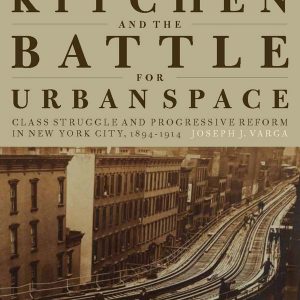Join author Joseph Varga and Monthly Review Press for a book launch celebrating Hell’s Kitchen and the Battle for Urban Space: Class Struggle and Progressive Reform in New York City, 1894-1914
Thursday, September 26, 7 pm, The New School for Social Research, Room 529, 80 Fifth Avenue (5th Ave. and 14th St.), NYC.
Co-sponsored by the Historical Studies Department of the New School for Social Research. Free and open to the public
Paperback ISBN: 978-1-58367-348-5
Cloth ISBN: 978-1-58367-349-2
Includes 26 photos and illustrations
e-book available!
Kindle, Sony Reader, Nook
“Henri Lefebvre never ventured into the bowels of Hell’s Kitchen, into its dumbbell and railroad tenements, down its grubby back streets and dingy piers west of Tenth Avenue. But Joseph Varga vividly brings him to life in fin-de-siècle Middle West Side Manhattan, dialoging with Progressive Era do-gooders and reactionary reformers, as well as rip off landlords and ordinary poor folk fresh off the boat. Hell’s Kitchen and the Battle for Urban Space is a sensitive study of the forces that make and break American blue-collar communities; and like the best spatial history it sheds light on an urban predicament that’s still unfolding.”
—Andy Merrifield, author, Magical Marxism: Subversive Politics and the Imagination, Henri Lefebvre: A Critical Introduction, and Dialectical Urbanism
“A fascinating history of an important historic neighborhood and a provocative analysis of the ways in which interest groups vie for control of urban geography. Varga’s book provides both forgotten facts and intriguing insights, helping readers understand why the neighborhood was once so important and what its cycles of transformation tell us about the future of urban America.”—Tyler Anbinder, author, Five Points; Professor of History, George Washington University
“Hell’s Kitchen during the Progressive Era was perceived as a slum of wretched and passive residents in the depths of poverty. Urban spaces, however, are created and restructured constantly, under the contesting forces of labor and capital. In fact, argues Joseph J. Varga, perceptions themselves are imaginary, and are used as weapons in combat along class, gender, and racial lines. This dynamic activist perspective gives hope to all those living in exploited and marginalized neighborhoods, providing a blueprint on how to build a zone of resistance, essential in gaining their rights as full citizens of American society.”—Peter Kwong, Distinguished Professor of Asian American Studies at Hunter College and at CUNY Graduate Center Sociology Department
“Boldly mitigates the gap between the rich body of theory about space and concrete ‘case study’ empirical research to provide an exceedingly original contribution to our understanding of urban space, not merely as a product of social and historical circumstances but also as a force that differentiates society and shapes history. Varga perceptively recognizes the full complexity of modern space as historically textured, ceaselessly produced and producing confluence of matter and mind: natural landscape, built-environment, market-driven ambitions, science, design, daily practices, and cultural imaginaries. The book persuasively demonstrates that conventional sociological and political categories—class, gender, race, ethnicity as well as citizenship—strongly intersect with space and, in fact, cannot be properly understood without their spatial permutations and inflections. It employs a inventive conceptual apparatus to grapple with the spatial/social dialectic in which spatial reconstruction both forges social identities and renders them fragile, opening in the process interstitial zones of resistance and contestation and generating new types of urban knowledge contained within the historical experiences and languages of uneven geographical development.”—Oz Frankel, Historical Studies Department Chair, Associate Professor of History, the New School for Social Research
“In Hell’s Kitchen on Manhattan’s mid-west side, working class residents constructed a multi-faceted world of work, family life and child-rearing, and entertainment. Progressive reformers saw this same space as a site of criminality, family neglect and violence, and ‘vice.’ Neither side knew the whole story. Here, Joseph Varga uses spatial and geographic analyses of capitalism to situate Hell’s Kitchen at the turn of the 20th century. His work illuminates the relationship between capitalist development and the lived spaces of the urban working class. Varga makes an important contribution here to our understanding of capitalism in the U.S. and in the capitalist roots of urban policies in the development of New York City. If you interested in either of these issues, or both, read this book.”—Paul C. Mishler, Associate Professor of Labor Studies, Indiana University


Comments are closed.